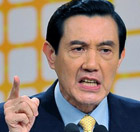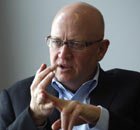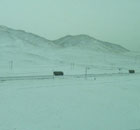Foreign and Military Affairs
US biggest perceived threat to PLA: Strategist
By QIN JIZE and WANG CHENYAN (China Daily)
Updated: 2010-04-26 07:51
 |
Large Medium Small |
Beijing - The United States is the greatest perceived threat to the People's Liberation Army (PLA), a top military strategist told China Daily on Sunday, confirming remarks made last week to a group of visiting senior US officials.
Yang said that the US was the only country capable of threatening China's national security interests in an all-round way, while answering a question on where the PLA perceived its greatest threat as coming from.
"This is a joke and not a joke," he said.
Yang also said that (frictions over) the cross-Straits relationship was the most likely to provoke a Sino-US nuclear war.
Japan has no such ability, while Russia has no such motivation and India is more worried about China, Yang explained.
Yang said Beijing was hoping to maintain and develop a stable and healthy relationship with Washington but it also needed to make necessary preparations for any possible threats and pressures.
"Fortunately, the risk of a Sino-US confrontation is decreasing due to the relaxation of the Taiwan question," Yang noted.
He said the Taiwan question would be solved politically rather than militarily, adding the cross-Straits relationship would become even more stable and secure if it continued to develop positively (as it is now) over the next five to 10 years.
Talking about US arms sales to Taiwan, Yang said: "Those weapons will be ours sooner or later."
The 17-member US group included office directors of US departments including the National Aeronautics and Space Administration (NASA), the Department of Defense and the Nuclear Regulatory Commission.
This is the first time that Washington has sent senior government officials to Beijing to engage their Chinese counterparts in a comparative educational dialogue.
Sun Zhe, the director of Tsinghua University's Center for US-China Relations who planned the course two years ago, said Yang had answered the questions in a frank manner.
"A US navy official in charge of intelligence asked the question and he quickly responded that it was the same case for China about the US," Sun said, adding it is very unique for naval officials from the two sides to exchange thoughts so honestly.
According to Sun, the frank communication was not intended as a threat, but that it would help the two powers to avoid strategically misjudging the other.
He said the Chinese naval official's firm attitude would help Washington to better understand Beijing's position on the Taiwan question.
The weeklong course concluded on Friday and the US government officials left the next day.











